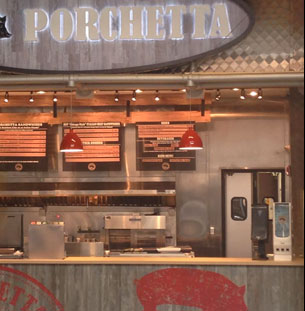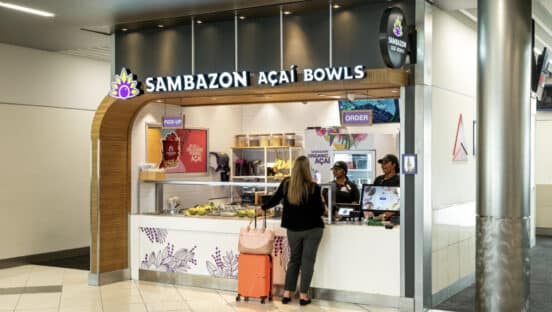Online retailers continue to swipe business—holiday and otherwise—from brick-and-mortar retailers, including shopping malls. Given consumers’ evolving attitudes toward shopping, signing a 10-year lease in a food court might sound like dicey move for an emerging quick serve. But for Nick Crosson, it was exactly the place he wanted to be.
In 2012, Crosson and his business partner Matthew Hayden cofounded the food truck Porchetta, which specializes in slow-roasted, Italian-style pork ciabatta sandwiches. While Porchetta had garnered a loyal customer base around the greater Raleigh-Durham, North Carolina, area, the partners wanted to grow.
“It was definitely getting to the point where we felt like we were starting to plateau as far as our growth capabilities with the truck. It was time to have a place where people didn’t have to follow us on social media and chase us around town to get one of our sandwiches,” Crosson says. In a timely twist, Crosson and Hayden were approached by General Growth Properties, which owns Southpoint Mall in Durham. “There was a small group of them that felt like the food court was a little outdated in its concepts. Durham has been getting such good national press in regards to the types of chefs that are here and the restaurants and the local scene, as well as the food trucks, but there was an aspect missing to the food court.”
Now Porchetta occupies one of nine slots in the Southpoint food court, and earlier this month it was joined by another truck-born concept, American Meltdown, which serves gourmet-style grilled cheese. Crosson says that ultimately General Growth would like three to four of the available slots to be local brands. The development group even asked Porchetta which concepts it might want as neighbors.
Filling food courts with unique, locally conceived quick serves—especially those that boast a higher quality than the typical chain—could help turn around the plight faced by many malls today.
According to a report from real estate broker Cushman & Wakefield, mall traffic fell from 35 billion visits in 2010 to only 17.6 billion in 2013. Nevertheless last month the largest high-end mall operator Simon Property Group (a competitor of General Growth, which is No. 2) hit a 52-week high on the New York Stock Exchange. Many financial analysts are also pointing to “Class A” malls—those that generate roughly $600 per square foot and are anchored by high-end retailers such as Bloomingdales and Saks Fifth Avenue, as well as tech all-stars like Apple—as worthwhile investments.
“We felt like Southpoint was in a different category. … [It’s] been able to stay a little bit ahead of the curve as far as trying to keep everything fresh and new and exciting. They do a good job with the marketing and keeping the flow of foot traffic coming through,” Crosson says. Indeed, the mall is anchored by a luxury department store (Nordstrom) and also has an Apple store. Before signing, Crosson and Hayden even did reconnaissance work, sitting at the food court at different times and on different days, estimating the business flow. “We felt like the numbers were there to be able to try to make this work, and also to expose ourselves to a completely new clientele," Crosson says.
Although Durham is not a large city, Crosson says, a number of customers who discovered Porchetta at the mall were either unaware of the brand or the fact that Durham had a food truck scene at all.
Beyond a visibility boost, a permanent location—be it inside a mall, in a shopping plaza, or on an downtown street—can help fledgling food truck concepts ramp up financial returns after years of pedaling the brand.
Last year, when QSR reported on the oversaturation and subsequent evolution of food trucks, Jethro Naude, co-owner of the Southern California truck-turned-restaurant Slapfish, said that he got in and out of the food truck game quickly.
“As I see it, the food truck is a home run from the marketing standpoint, but from a financial standpoint, it’s just there,” Naude told QSR. “Food trucks made the food industry sexy again.”
Crosson’s own sentiments are not so different from Naude’s; he says that the current movement is doing for food what craft brewing did for beer a decade ago. And for him, the Southpoint store is a natural stepping stone for Porchetta. Long term, he can picture the brand expanding to another brick-and-mortar shop, but he says that is farther down the road.
For the time being, he will focus on delivering the best product possible and growing Porchetta’s clientele—the latter of which could enjoy an uptick as the holiday shopping season arrives.
“We’re seeing a lot of feedback on social media, a lot of new followers, a lot of new Facebook likes,” Crosson says. “People that didn’t know us are definitely interested in what we’re doing out here, so we feel like we’re doing the right thing.”








